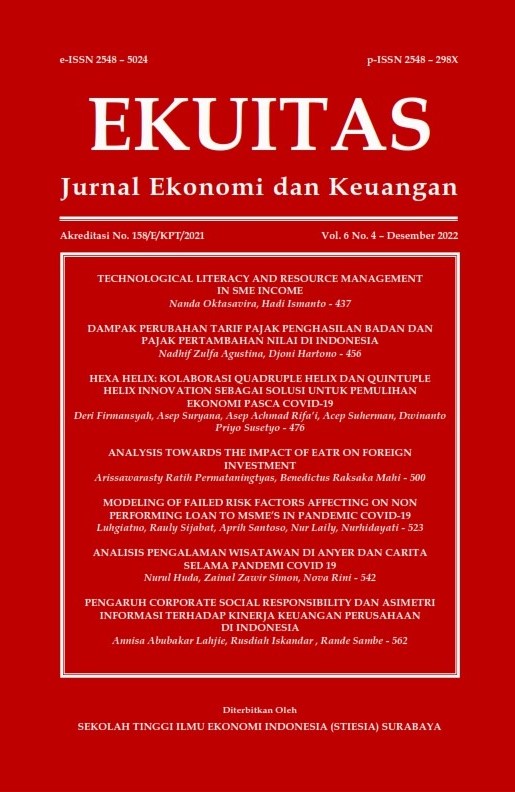MODELING OF FAILED RISK FACTORS AFFECTING ON NON PERFORMING LOAN TO MSME’S IN PANDEMIC COVID-19
DOI:
https://doi.org/10.24034/j25485024.y2022.v6.i4.5053Keywords:
Non Performing Loans, default risk, internal factorsAbstract
The contribution of Micro, Small, and Medium Enterprises (MSME) performance has a strategic role as a buffer for the national economy. The economic crisis that has hit Indonesia several times, including during the COVID-19 pandemic, has hit the MSME sector, so the sector is no longer able to repay its loans. Even though at that time the MSME sector was working to fix the classic problems that hampered it is performance. Departing from this phenomenon, this study examines the results of previous studies to map five exogenous variables, namely debt character factors, financial factors, management factors, operational factors as well as market and marketing factors as explanatory variables that allegedly cause MSMEs to experience the risk of failing to pay credit which has an impact on the poor NPL. The results of the SEM analysis of data from 125 MSMEs in Semarang City affected by COVID-19 showed that the high risk of default experienced by MSMEs was caused by debt character factors, financial factors, management factors, operational factors, and poor market and marketing factors which then impact on increasing the NPL ratio.
References
Arinta, D. Y. 2014. Pengaruh Karakteristik Individu, Karakteristik Usaha, Karakteristik Kredit terhadap Kemampuan Debitur Membayar Kredit pada BPR Jatim Cabang Probolinggo (Studi pada Nasabahn UMKM Kota Probolinggo). Jurnal Ilmiah Mahasiswa 3(2): 1-16.
Armiati. 2013. Women Entrepreneurs Serta Faktor-Faktor yang Mempengaruhinya (Kasus pada Pengrajin Sulaman Wanita di Jorong Lundang Kanagarian Panampuang Kab. Agam). Economica, Jurnal Program Studi Pendidikan Ekonomi STKIP PGRI Sumatera Barat 1(2): 19–34.
Dhamayantie, E. and R. Fauzan. 2017. Penguatan Karakteristik dan Kompetensi Kewirausahaan Untuk Meningkatkan Kinerja UMKM. Matrik: Jurnal Manajemen, Strategi Bisnis dan Kewirausahaan 11(1): 80–91.
Dipta, I. W. 2012. Memperkuat UKM Menghadapi Masyarakat Ekonomi Asean Tahun 2015. Jurnal Infokop 21: 1–12.
Hanis, U. and J. Nursyamsi. 2013. Pengaruh Prasyarat Kredit terhadap Kelancaran Pembayaran Nasabah (Studi Kasus Nasabah pada PT Bank Bukopin Kantor Cabang Pembantu Cilegon). UG Journal 7(5).
Haron, H., S. B. Said, K. Jayaraman, and I. Ismail. 2013. Factors Influencing Small Medium Enterprises (SMES) in Obtaining Loan. International Journal of Business and Social Science 4(15).
Hati, S. W. and Irawati, R. 2017. Faktor-Faktor yang Mempengaruhi Kinerja Usaha Mikro Kecil Menengah (UMKM) Di Kota Batam. Proceeding of 5th Applied Business and Engineering Conference: 545–558.
Moti, H. O., J. S. Masinde, N. G. Mugenda, and M. N. Sindani. 2012. Effectiveness of Credit Management System on Loan Performance: Empirical Evidence from Micro Finance Sector in Kenya. International Journal of Business, Humanities and Technology 2(6): 99-108.
Muslim, K. M. 2012. Analisis Faktor-Faktor yang Mempengaruhi Kredit Macet (Kurang Lancar, Diragukan, dan Macet) pada UMKM Industri Mebel di Kabupaten Jepara Tahun 2012. Diponegoro Business Review 1(1).
Purwidianti, W. 2015. Pengaruh Faktor Internal dan Eksternal Terhadap Kinerja Usaha Industri Kecil dan Menengah di Purwokerto Utara. KINERJA 19(1): 149–159.
Firdaus, R. and Ariyanti, M. 2016. Manajemen Perkreditan Bank Umum. Alfabeta. Bandung.
Sijabat, R. 2017. Penguatan Kinerja Pemasaran Melalui Pengembangan Inovasi dan Kreativitas Program Kerja pada Wirausaha Muda di Semarang. Jurnal Sains Pemasaran Indonesia 16(1): 26–43.
Widayanthi, L. I. 2012. Pengaruh Karakteristik Debitur UMKM Terhadap Tingkat Pengembalian Kredit Pundi Bali Dwipa (Studi Kasus Nasabah Pada PT. Bank Pembangunan Daerah Bali Kantor Cabang Singaraja). Jurnal Ilmiah Mahasiswa Fakultas Ekonomi dan Bisnis 1(2): 1–15.














